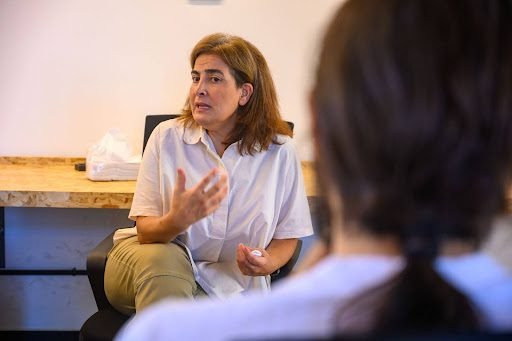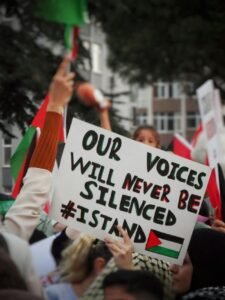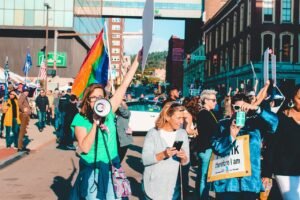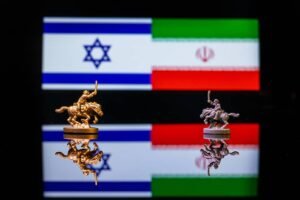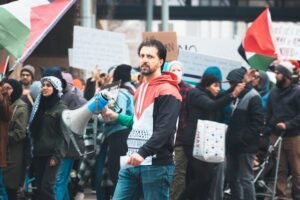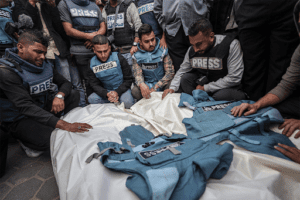Amid the recent media coverage of the genocide in Gaza, very few journalists stand solid in their ethical and editorial guidelines around the world. Tycoon media Organizations stand on a long line of variety between those who lost their credibility due to conscious and unconscious bias practising disinformation, those who lost the ability to differentiate between journalism and propaganda, and those who just got their facts wrong due to misinformation.
In the Middle East, fewer journalists stood behind the frontlines doing their job professionally and objectively. Amongst those is Diana Moukalled and her co-founded prominent Daraj. Recently Daraj was subjected, however to a fierce campaign by one component of the Lebanese public opinion mounted to a targeting campaign on social media and threatening Diana and her colleagues personally.
Times For Palestine’s Rasha Qandeel interviews Diana Moukalled and asks her which is harder in confrontation for her as editor of chief and co-founder of Daraj; foreign threats since the Ukraine war to independent Arabic-speaking journalism or local threats Daraj fell under from Hezbollah sympathizing audience?
I do not find a way to compare between the two stances. As individuals and as media workers, we are following the changes in a world torn by wars, divisions, and polarization, for which we pay great prices because we are among the weakest links and because we belong to a region governed by authoritarian and non-democratic regimes. Therefore, we find ourselves facing two extremely complex choices: dealing with a turbulent world steeped in double standards, as the war of genocide taught us. Israeli forces in Gaza, and on the other hand, our local world, which is mired in crises and governed by corrupt sectarian regimes and leaders and armed militias.
Regarding campaigns, this is a permanent matter that did not begin in recent weeks and will not end because we are working in a difficult local environment, as it is an environment that reflects the fluctuations in governance and local unrest in which we live. Campaigns may subside at times and may escalate at other times, as happened recently. Commitment to the profession, its standards and ethics is the only constant in this whole situation that helps us continue despite everything.
How is the Lebanese journalist positioned, especially when it comes to politically sensitive matters? Is there institutional protection for any Lebanese journalist at home, away from sectarianism?
Lebanon is a country with its own characteristics, meaning we still enjoy, albeit chaotically, a heritage of relatively public and individual freedoms. It is true that there is a persistent effort by several parties in power, partisan, political, sectarian, and financial as well, to cordon off the spaces of freedom of expression and media under various pretexts, but we in Lebanon are still able to move in the digital and media space. This is not a matter of praise, because the spaces are practically narrowing with the increase in the rates of legal prosecutions and with the increase in campaigns of treason and physical targeting. This was repeated in several demonstrations, and of course, we do not forget the assassination of the writer and publisher Luqman Slim in a country that has an unfortunate history of assassinating journalists, writers, and political opponents.
In addition to this is the fact of the sectarian division of the media, which was established at the beginning of Lebanon’s post-war era in the early nineties, when television media licenses were distributed on a sectarian basis, making journalists subject to sectarian political editorial considerations. Of course, there are male and female journalists who have proven their capabilities and presence, but these remain individual efforts under a political sectarian liberation umbrella that controls media content.
This reality made the Editors’ Syndicate and the Press Syndicate an echo of sectarian political influence and not a body to protect the profession and its people. From here, the “Alternative Press Syndicate” group emerged as an unofficial but vital body that tries to lobby for the issues and rights of journalists, whether those who are subject to persecution, arbitrary expulsion, or harassment.
In general, there is no serious protection in the major traditional media institutions outside the current sectarian context in Lebanon, and hence the movement of several civil society institutions and alternative or independent media bodies to create journalistic and human rights entities that are not subject to the sectarian or partisan editorial standards that control the media space in the country.
How do you personally deal with targeting campaigns and how do you respond to those who accuse journalistic foundations, such as Daraj, of provocation and intentionally creating crises to supply trends and Reach?
In the last decade, the phenomenon of campaigns on social media has become widespread, not only in Lebanon and the region, but in the world. My dealings with it vary. If the campaign is from public and clear parties, whether from well-known figures or public media, then I sometimes try to respond and clarify if there is confusion, but I often ignore campaigns if they are from digital armies or fictitious personalities whose identity is unclear.
Regarding “Daraj”, I think if our concern had been excitement and the audience, our coverage would have been completely different and the content of what we published would have been completely far from excitement, whether political or cultural.
In our coverage, we address issues of corruption, violations, freedom of expression, and individual rights. These issues are inherently problematic in our region, which is governed by corrupt and tyrannical regimes in which traditional, conservative legacies prevail. We are subject to attack and criticism from various parties. If our goal was “Reach,” we would have focused on easier and more attractive issues. For interaction and audience.
How can partnerships at the level of individuals or independent institutions constitute mutual protection for some of these targets?
This is something we have been discussing for some time with partners, whether in Lebanon or the region, from the independent media community or organizations and groups concerned with freedom of expression and media.
There are cross-border partnerships both at the dissemination and advocacy levels. For example, if someone is being targeted in a certain country, we try to intensify publication in another country for advocacy and to educate public opinion. In addition, of course, to professional groupings such as the “Coalition for Freedom of Opinion and Expression” in Lebanon or groupings concerned with digital rights throughout the region, as well as groupings concerned with feminist and gender rights.
These gatherings of bodies and groups that share a minimum of professional and legal values are often for mutual dissemination and advocacy, and most importantly for joint thinking about the complex and difficult reality we live in in the region and reaching work mechanisms that are commensurate with the magnitude of the challenges we face.
Is it possible to truly be liberated from the dictates of those who fund independent journalism?
This begins primarily with the choice of the financing party and the foundations upon which we unite.
When we founded “Daraj,” the first concern for us was and still is financial independence because it alone guarantees editorial independence. Hence the idea of multiple sources of income, whether through producing content or through providing media services and training, to be part of the source of income. Of course, the greatest reliance is still on funding (about 80%), and here our policy was not to take funding from governments that are politically and militarily involved in the region, nor from organizations that might exert any kind of editorial pressure on us. In fact, there is no editorial control over what we produce, and those who follow the content we produce can The issues are noted and the critical approach includes all parties and issues.
How does independent journalism revolve around its passionate followers, given the extreme political polarization in the world? Do we write what the recipient likes as a price for keeping him?
What is the alternative?
I believe that this challenge is not limited to the Arab press. In parallel with the Israeli war of genocide in Gaza, we can notice the emergence of independent voices and journalism, even at the level of the West, with increasing dissatisfaction with the approaches of major media outlets. We are now noticing more voices trying to create a truly independent media.
In the Arab world, the regimes still invest huge amounts of money in the media, cinema, and all areas of culture and expression to control the narratives they want, and this undoubtedly creates enormous pressure on independent or alternative media.
“Do we write what the recipient likes?”… This question is a trap in which responses vary according to the location and party, and I do not think that alternative media are on the same level in dealing with this.
The challenge is to create a balance between editorial commitment to serious, high-level professional issues and treatments, and the ability to attract wide segments of recipients, and this is a daily challenge that we face, especially with the pressures of social media algorithms that restrict our work and determine its path.
Finally, how does Daraj deal with the degree of targeting that amounts to insult and slander, and how do you see the future of journalism under the pressure of lobbyists in the world and Lebanon?
We do not respond or interact with campaigns of insult and defamation, which are many, because it is useless to deal with this language. Anyone who deals with social media must be aware and welcome the idea that this is a space open to all forms and responses, and we cannot change them but rather continue practising our profession with full commitment.

